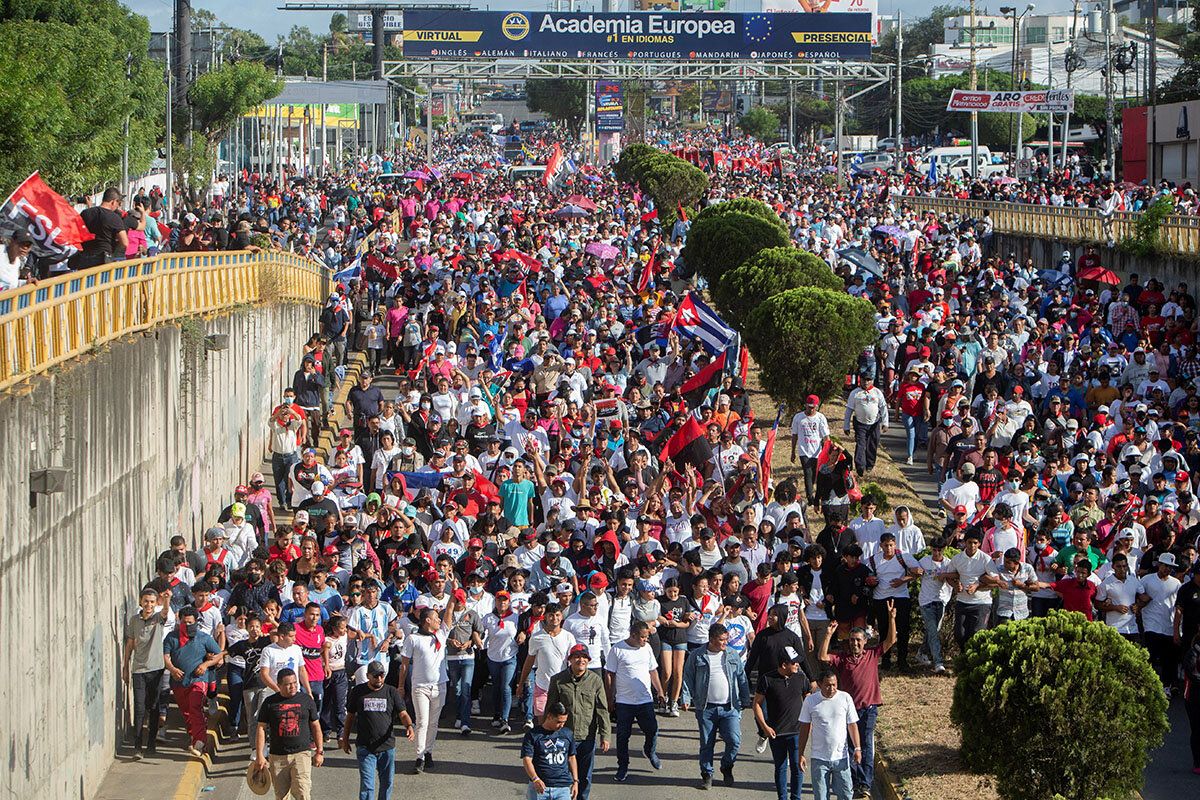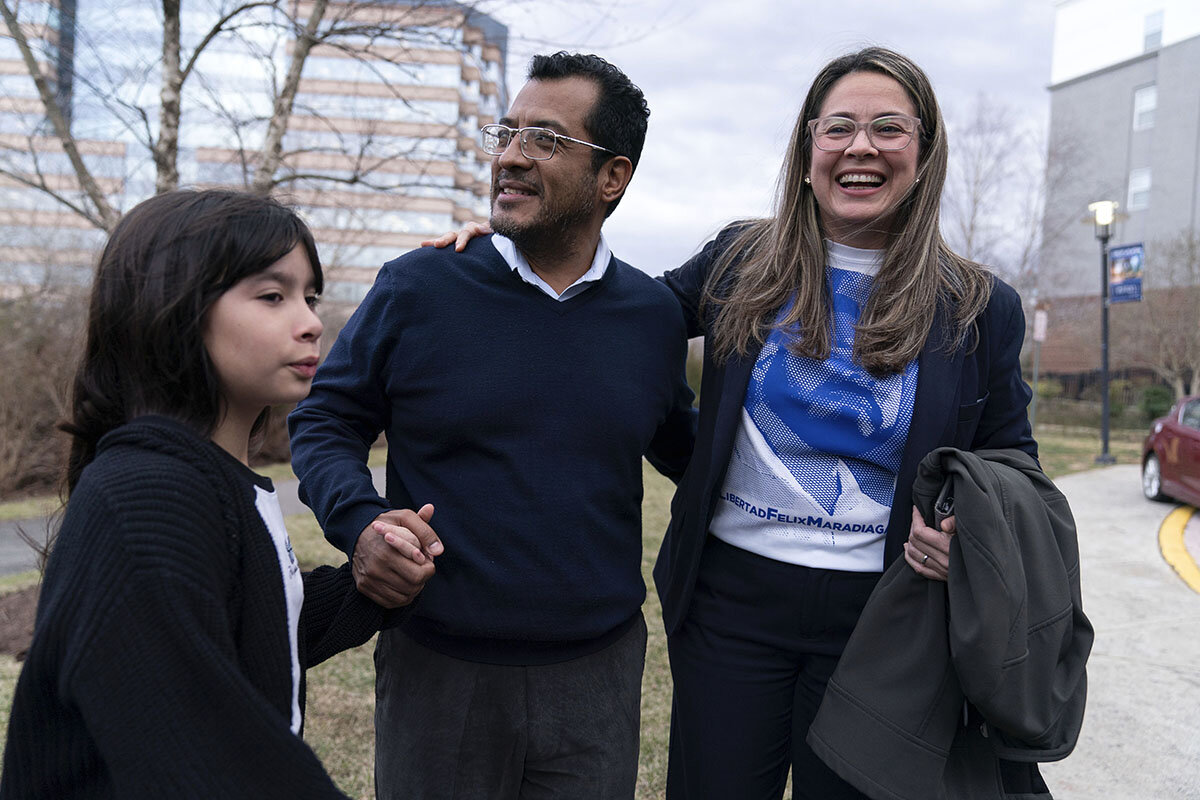Nicaragua's prisoner release: A win or loss for human rights?
Loading...
| Mexico City
Ulises Mendieta, a young Nicaraguan journalist, knows something about exile – particularly what can and cannot be accomplished living in it.
For nearly three years, he has helped build a Nicaraguan news site, collaborating with sources back home to cover national politics and share information beyond President Daniel Ortega’s party line. It’s work that puts sources – and his loved ones still in Nicaragua – at risk, but it allows him to push for a “free” Nicaragua, he says.
Now, many more will be faced with navigating how to advocate for democracy and freedom of information in the increasingly authoritarian Central American nation when living abroad. On Feb. 9, 222 Nicaraguans, including high-profile politicians, journalists, activists, and students, were sent into exile after months and sometimes years behind bars on often sham or trumped-up charges brought by Mr. Ortega’s repressive government. They were put on a U.S. charter flight to Washington, D.C.
Why We Wrote This
Political exiles navigate two currents: the relief of safety against the loss of home. Prisoners released from Nicaragua to the U.S. must confront the limitations of what they can accomplish from afar.
As these individuals face the complicated duality of exile – relief in personal safety, or in some cases reuniting with family, contrasting with the challenge of losing a home and leaving others behind – they are also likely to confront limitations in democracy-building with Mr. Ortega’s power consolidated.
“The release of the 222 people who were living under terrible circumstances for a prolonged period of time is a huge humanitarian gain,” says Richard Feinberg, professor emeritus of international political economy at the University of California, San Diego. “But, if you’re looking at the politics ... I think Daniel Ortega has rid himself of the leadership of the opposition; strengthening, not weakening, his authoritarian grasp on Nicaraguan politics.”
There’s “no counterweight to the local government,” explains one Nicaraguan academic, who spoke on the condition of anonymity given the repercussions for critiquing Mr. Ortega’s government. “Even compared to other dictatorships in Latin America, local resistance is extremely weak in Nicaragua,” he says, adding that this weakness restricts how successfully Nicaraguans can push for democratic change from outside the country’s borders.
Mr. Ortega, a former revolutionary, rose to fame in the 1970s and ’80s after helping the Sandinista Revolution topple a decadeslong dictatorship. He went on to lead for 11 years following the 1979 overthrow. But since 2006, when he won the presidency once again, he has centralized power (even making his wife his vice president), chipped away at free expression, shuttered media outlets and nongovernmental organizations, and cracked down on political dissent, especially since anti-government protests erupted in the spring of 2018.
Many of the political prisoners released last week were arrested and charged in the lead-up to the widely discredited 2021 presidential vote. The broad arrests – and the exodus of many objectors – eliminated any semblance of competition for Mr. Ortega, ushering in his fourth consecutive term.
The U.S. has responded to the human rights violations by imposing sanctions on Mr. Ortega and his family, as well as against high-ranking government officials and the mining and gold sectors.
Many foresee a difficult year ahead, with economic growth projected at less than 2% amid growing inflation. Nearly 604,500 Nicaraguans fled between 2018 and 2022, half of that in 2022 alone, according to Nicaraguan news site Confidencial.
A win for human rights?
In this month’s prisoner release, as soon as they arrived in the U.S. the Ortega government stripped them of their Nicaraguan citizenship. Spain offered citizenship, and the U.S. has granted the individuals two years of humanitarian parole, allowing them to remain in the U.S. and apply for asylum, if they choose.
In a statement Feb. 9, U.S. Secretary of State Antony Blinken praised the release as a step “toward addressing human rights abuses” in Nicaragua. But back home Mr. Ortega echoed a long-touted idea that anyone opposing his government was in the pocket of the U.S., saying Washington should “take their mercenaries.” Over the weekend, hundreds of thousands marched in Nicaragua, celebrating the “sovereignty of their country” and the expulsion of “the terrorists,” as state-run news sites referred to the former prisoners, parroting Mr. Ortega.
“This is a moment of great uncertainty,” says the Nicaraguan academic. “It would be a mistake to assume this is the first step to some great opening or loosening of the police state. It could just as well be the opposite; [Mr. Ortega] taking this as a first step toward tightening things further.”
The release took everyone by surprise, with relatives of former political prisoners in the U.S. rushing to Washington to embrace their loved ones. Many had believed they would never see their family again. Amid the relief and elation are questions around what happens next.
Few are hopeful for positive change inside Nicaragua in the short term. The government has spent the past several years “building out their security apparatus’ control throughout the entire country, adding to their networks of informants within Nicaragua,” says Kai Thaler, an assistant professor focusing on authoritarianism at the University of California, Santa Barbara. “It’s really, really hard to organize or engage in new protests, because people now know, ‘alright, even if I’m not a very prominent person, I can still wind up in jail, facing torture and mistreatment,’” he says.
On top of that, the government has all but erased civil society, closing more than 400 NGOs since the 2018 protests.
“It’s really bittersweet,” says Mr. Mendieta, the journalist, now with asylum in Costa Rica. “There’s the joy from the news of the political prisoners’ release, but at the same time, the realization that the regime has created an environment of self-censorship, and everyone feels its weight. You can’t say anything on social media, you can’t say anything to your neighbors. Even if Ortega were to go tomorrow, it will be hard to re-create a culture of freedom of expression and respect for human rights.”
For some, that is where the released prisoners and other Nicaraguans living abroad come in.
Activism in exile
Some are already speaking out. José Ricardo Muñoz López, a young political activist involved with the Nicaraguan Democratic Force who was imprisoned for four months, told he plans to hold demonstrations against Mr. Ortega’s repression globally, demanding the release of remaining political prisoners in Nicaragua. But once his humanitarian parole expires in two years, he wants to “return to Nicaragua, to defend social justice,” he said.
“There is always diaspora activism and activism in exile. The problem for Nicaragua’s opposition for a while has been unity,” says Dr. Thaler. “Now the challenge is going to be, if they’re going to continue speaking out in exile, how that is coordinated, or what people see as potential options for still achieving political change inside Nicaragua.”
Mr. Mendieta says he doesn’t expect everyone who was exiled to commit to publicly fighting for Nicaragua’s future. Although he was never imprisoned, his journey out of Nicaragua came with its share of challenges. “They are in a vulnerable situation, and they need to first take care of themselves and their loved ones,” he says.
But “Nicaraguans have heart” and those forced to leave home “will always want a free Nicaragua,” he says. He expects that anyone, whether they’re exiled or make the difficult choice to leave, is going to “fight in his or her own way, to do what they can for the future of Nicaragua,” he says, “even if they aren’t super visible.”







